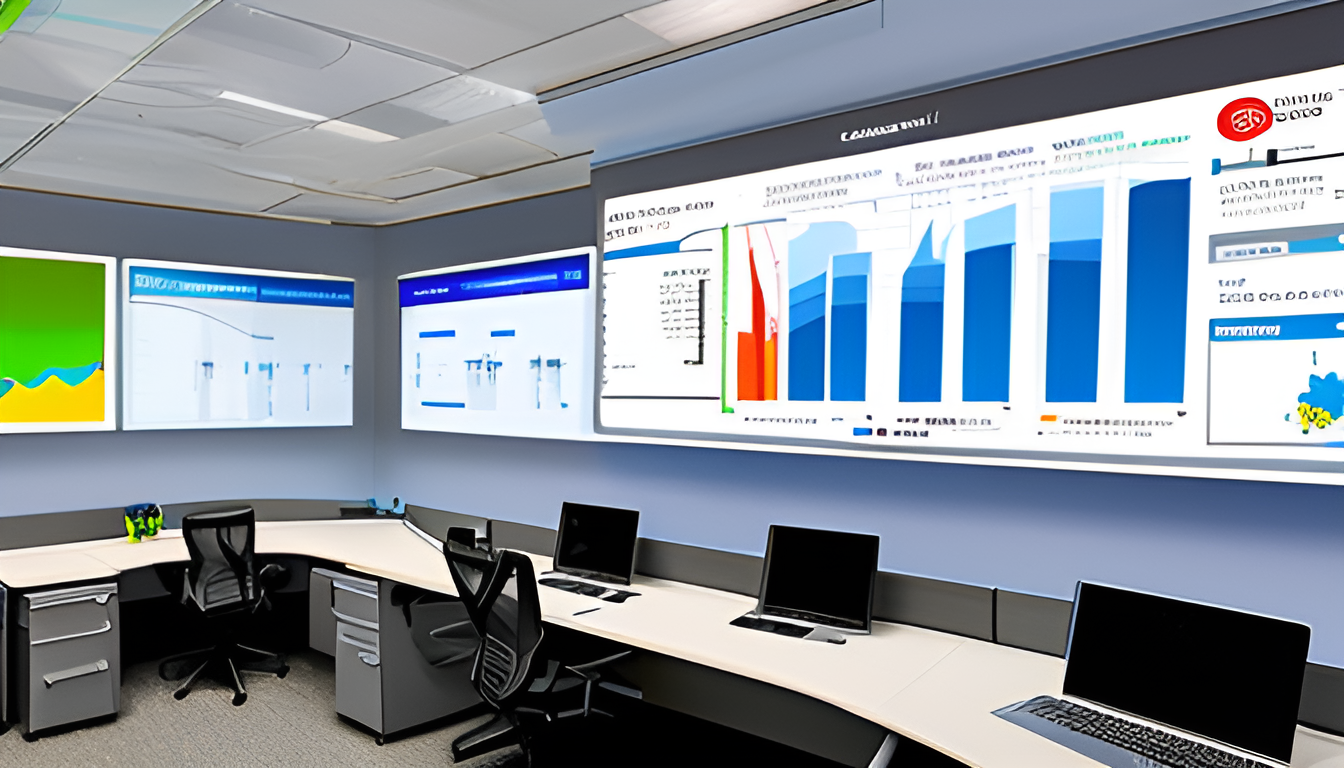The Role of AI in Project Management Efficiency

In today’s fast-paced world, artificial intelligence (AI) is not just a buzzword; it’s a game changer in the realm of project management. Imagine having a personal assistant that never sleeps, always analyzes data, and helps you make decisions that can lead to greater efficiency and productivity. This article explores how AI enhances project management processes, improves decision-making, and optimizes resource allocation, ultimately leading to successful project completions across various industries.
To truly appreciate AI’s role in project management, we must first understand what AI is and how it applies to our workflows. AI refers to the simulation of human intelligence in machines that are programmed to think and learn. In project management, AI transforms traditional methodologies into data-driven practices, enabling project managers to leverage vast amounts of information for better outcomes. With tools that can predict project timelines and analyze team performance, AI makes project management not just easier but also smarter.
Integrating AI into project management offers a plethora of benefits. Consider the following:
- Time Savings: Automating routine tasks allows teams to focus on strategic initiatives.
- Improved Accuracy: AI minimizes human error, providing more reliable data for decision-making.
- Enhanced Collaboration: AI tools facilitate better communication among team members, leading to more cohesive efforts.
These advantages culminate in more successful project completions, ensuring that teams meet their goals efficiently.
One of the most significant impacts of AI in project management is the automation of routine tasks. By handling repetitive functions such as scheduling meetings, tracking progress, and updating project statuses, AI frees up valuable time for project managers and teams. This shift allows them to concentrate on strategic planning and creative problem-solving, ultimately boosting productivity and morale.
AI-powered tools excel in optimizing task scheduling and resource allocation. They analyze team workloads and project timelines to ensure that every team member is effectively utilized. This not only helps in meeting deadlines but also ensures that project goals are achieved without unnecessary delays.
Moreover, AI can analyze historical data to identify potential risks. By providing insights for proactive risk management, project managers can mitigate issues before they escalate, ensuring smoother project execution.
AI significantly enhances data analytics capabilities, providing project managers with actionable insights and real-time feedback. This allows for informed decision-making throughout the project lifecycle, ensuring that teams stay on track and aligned with their objectives.
Understanding AI in Project Management
Artificial Intelligence (AI) is revolutionizing the way we approach project management. At its core, AI refers to the simulation of human intelligence in machines, enabling them to perform tasks that typically require human cognition. In the realm of project management, AI is not just a buzzword; it’s a game changer that transforms traditional methodologies into data-driven practices. Imagine having a digital assistant that can analyze vast amounts of data in seconds, providing insights that would take a human hours or even days to uncover.
AI applications in project management are diverse and impactful. From predictive analytics that forecast project outcomes to intelligent scheduling tools that optimize resource allocation, AI enhances decision-making processes. By leveraging algorithms and machine learning, project managers can now identify patterns in data that help in anticipating challenges before they arise. For instance, AI can analyze past project performances and suggest adjustments to timelines or resource distribution, ensuring that teams are always on track.
Moreover, the integration of AI into project management fosters a shift from reactive to proactive management. Instead of merely responding to issues as they occur, project managers can utilize AI to foresee potential risks and address them in advance. This predictive capability is akin to having a weather forecast for your project; just as you would prepare for a storm, you can prepare your team for potential project disruptions.
To illustrate the transformative potential of AI in project management, consider the following table:
| AI Application | Impact on Project Management |
|---|---|
| Predictive Analytics | Anticipates project risks and outcomes, enabling proactive adjustments. |
| Automated Scheduling | Optimizes task assignments and timelines, improving efficiency. |
| Data Analysis | Provides actionable insights from historical data for better decision-making. |
In summary, understanding AI in project management is crucial for any organization aiming to stay competitive. As we embrace this technology, we unlock new levels of efficiency and productivity that were previously thought impossible. Are you ready to harness the power of AI for your next project?
Benefits of AI Integration
Integrating artificial intelligence into project management isn’t just a trend; it’s a game-changer! Imagine having a dedicated assistant that never sleeps, tirelessly analyzing data and helping you make informed decisions. The benefits of AI integration are numerous and can significantly enhance the way teams operate, leading to greater efficiency and productivity.
First and foremost, one of the most notable advantages is the time savings. By automating repetitive tasks, AI allows project managers to focus on what truly matters—strategic planning and creative problem-solving. This means less time spent on mundane activities and more time driving projects forward. For instance, AI can handle scheduling, updates, and even basic communications, which can feel like having a personal project assistant!
Moreover, the accuracy of project outcomes improves dramatically with AI. Traditional project management often relies on human judgment, which can be influenced by bias or oversight. In contrast, AI uses data-driven insights to guide decisions, minimizing errors and enhancing the overall quality of the project. Imagine being able to predict project bottlenecks before they happen—this is the power of AI!
Collaboration among team members also sees a significant boost. With AI tools, teams can share real-time data and insights effortlessly. This transparency fosters a culture of teamwork and collaboration, where everyone is on the same page. For example, AI platforms can provide a centralized hub for communication, ensuring that all team members have access to the latest information.
In summary, the integration of AI into project management brings about:
- Time savings through automation
- Improved accuracy in project outcomes
- Enhanced collaboration among team members
These benefits not only lead to more successful project completions but also pave the way for a more innovative and adaptable work environment. As organizations continue to embrace AI, the potential for transformation in project management is not just exciting; it’s essential for staying competitive in today’s fast-paced world.
Automation of Routine Tasks
Imagine a world where your project management tasks are handled with the precision and speed of a well-oiled machine. Automation powered by artificial intelligence (AI) is making this vision a reality. By automating routine tasks, AI allows project managers and their teams to shift their focus from mundane activities to more strategic and creative endeavors. This shift not only boosts productivity but also enhances overall project outcomes.
Think about it: how much time do you spend on repetitive tasks like updating spreadsheets, sending reminders, or tracking progress? These activities can drain your energy and creativity. With AI, these tasks can be automated, allowing you to concentrate on what truly matters—driving your project to success. For instance, AI tools can automatically generate status reports, schedule meetings, and even send notifications to team members.
Here’s a quick overview of some routine tasks that can be automated:
- Data Entry: AI can input data into project management software, reducing human error.
- Progress Tracking: Automated systems can track milestones and deadlines, providing real-time updates.
- Meeting Scheduling: AI can find suitable times for meetings based on team availability.
By implementing these AI-driven solutions, project managers can reclaim valuable hours each week. This newfound time can be redirected towards strategic planning, fostering team collaboration, and tackling complex problems that require human creativity and insight. The result? A more agile and responsive project team that can adapt to changing requirements and challenges.
In summary, the automation of routine tasks through AI not only streamlines project management processes but also empowers teams to unlock their full potential. As we embrace these technologies, we pave the way for a future where project management is less about juggling tasks and more about innovating and achieving remarkable results.
Task Scheduling and Resource Allocation
Imagine trying to juggle multiple balls while blindfolded—that’s what project managers often feel like without the right tools for task scheduling and resource allocation. Fortunately, with the integration of AI, this daunting task transforms into a seamless experience. AI-powered tools analyze team members’ workloads, skill sets, and availability, ensuring that each task is assigned to the right person at the right time. This not only enhances productivity but also fosters a sense of ownership among team members.
AI algorithms can predict which resources are needed for specific tasks, taking into account their past performance and current project demands. For example, if a project requires a graphic designer, the AI can assess who has the best track record for similar tasks and allocate them accordingly. This data-driven approach eliminates guesswork and reduces the chances of burnout among team members, as tasks are distributed more evenly.
Moreover, AI can help in visualizing the project timeline and resource allocation through intuitive dashboards. These dashboards offer real-time insights into the project’s progress, allowing managers to make quick adjustments if a team member is overloaded or if a deadline is at risk. Here’s a brief look at how AI enhances task scheduling:
| Feature | Benefit |
|---|---|
| Workload Analysis | Ensures balanced distribution of tasks among team members |
| Skill Matching | Assigns tasks to the most qualified individuals |
| Real-Time Adjustments | Allows for quick reallocation of resources as needed |
In summary, AI’s ability to streamline task scheduling and resource allocation not only saves time but also enhances the overall efficiency of project management. By leveraging these advanced technologies, organizations can ensure that projects are completed on time and within budget, while maintaining a motivated and effective team.
Risk Management
In the dynamic world of project management, is a crucial component that can make or break a project’s success. With the integration of artificial intelligence, project managers are now equipped with powerful tools that can analyze vast amounts of historical data to identify potential risks before they even surface. Imagine having a crystal ball that not only predicts challenges but also offers insights on how to navigate them—this is the magic that AI brings to the table.
AI algorithms can sift through data patterns, learning from previous projects to highlight risks that might not be immediately apparent. For instance, if a project frequently faced delays due to resource shortages, AI can flag similar upcoming projects for potential resource allocation issues. This proactive approach allows teams to implement solutions before problems escalate, ultimately saving time and resources.
Moreover, AI can enhance the risk assessment process by providing real-time analytics. Project managers can receive updates on risk factors as they evolve, enabling them to make informed decisions on the fly. This agility is vital in today’s fast-paced environment, where the ability to adapt can significantly influence project outcomes.
To illustrate the impact of AI in risk management, consider the following table that outlines traditional risk management versus AI-enhanced risk management:
| Aspect | Traditional Risk Management | AI-Enhanced Risk Management |
|---|---|---|
| Data Analysis | Manual analysis of past projects | Automated analysis of large datasets |
| Risk Identification | Periodic reviews | Continuous monitoring and alerts |
| Response Time | Slower reaction to emerging risks | Immediate insights and recommendations |
In conclusion, the integration of AI in risk management not only enhances the ability to foresee challenges but also empowers project managers to respond swiftly and effectively. By embracing these innovative tools, teams can transform risk management from a reactive measure into a strategic advantage, ensuring that projects remain on track and objectives are met with greater confidence.
Enhanced Data Analytics
In the fast-paced world of project management, data-driven decisions are more critical than ever. This is where artificial intelligence (AI) steps in, transforming the way project managers approach their tasks. By leveraging AI, teams can unlock a treasure trove of actionable insights that were previously buried beneath layers of data. Imagine having a crystal ball that not only shows you the current state of your project but also predicts future challenges and opportunities. That’s the power of enhanced data analytics!
AI tools analyze vast amounts of historical data to identify trends and patterns, providing project managers with a clearer picture of what works and what doesn’t. For instance, AI can highlight factors that lead to project delays or budget overruns, allowing teams to proactively address these issues before they snowball. Here are some key benefits of enhanced data analytics:
- Real-time Feedback: AI systems can provide instant feedback on project performance, enabling quick adjustments and keeping everything on track.
- Predictive Analysis: By assessing past project outcomes, AI can forecast potential risks and suggest mitigation strategies.
- Customized Reporting: AI can create tailored reports that focus on specific metrics relevant to stakeholders, enhancing communication and transparency.
Moreover, the integration of AI in data analytics allows for seamless collaboration among team members. Imagine a scenario where everyone on the team has access to the same real-time data, fostering a culture of transparency and shared goals. This collaborative environment not only boosts morale but also drives project success.
In conclusion, as project managers embrace AI-enhanced data analytics, they gain a competitive edge in decision-making and resource management. By turning data into a strategic asset, teams can navigate the complexities of project management with confidence and agility, ultimately leading to greater efficiency and productivity.
Challenges in AI Adoption
While the integration of artificial intelligence in project management offers numerous benefits, it also presents a set of challenges that organizations must navigate. One of the most significant hurdles is resistance to change. Many team members may feel apprehensive about adopting new technologies, fearing that AI could replace their jobs or disrupt established workflows. To combat this, organizations need to foster a culture of innovation, encouraging team members to view AI as a tool that enhances their capabilities rather than a threat.
Another major concern is data privacy and security. With AI systems processing vast amounts of sensitive information, ensuring that this data is secure is paramount. Companies must implement robust security measures and comply with regulations to protect their data while leveraging AI’s capabilities. This includes educating staff on best practices for data handling and ensuring that AI systems are designed with security in mind.
Additionally, the need for training cannot be overlooked. Employees must be equipped with the skills necessary to work alongside AI tools effectively. This may involve investing in training programs or workshops that help team members understand how to utilize AI to its fullest potential. Without proper training, organizations risk underutilizing AI technologies, which can lead to wasted resources and missed opportunities.
In summary, while the road to AI adoption in project management is fraught with challenges, addressing these issues head-on can pave the way for a smoother transition. By fostering a culture of adaptability, prioritizing data security, and investing in training, organizations can unlock the full potential of AI and enhance their project management processes.
Overcoming Resistance to Change
Change is often met with skepticism, especially when it involves integrating advanced technologies like artificial intelligence into project management. Many team members may feel threatened by the prospect of AI taking over their jobs, or they might simply be comfortable with traditional methods. To overcome this resistance, organizations must create a culture that embraces innovation and adaptability. It’s crucial to communicate the benefits of AI clearly and consistently. For instance, when team members understand that AI is not here to replace them but to enhance their capabilities, they’re more likely to welcome it with open arms.
One effective strategy is to involve team members in the AI implementation process from the very beginning. This can be achieved through workshops and training sessions that not only educate them about AI but also allow them to voice their concerns and suggestions. By fostering an environment of open dialogue, organizations can demystify AI and reduce fear. Additionally, showcasing real-life examples of how AI has positively impacted other projects can serve as a powerful motivator.
Another significant aspect is to provide ongoing support during the transition. Change can be daunting, and having a dedicated team to assist employees can make a world of difference. This support can take the form of mentorship programs, where experienced users guide their peers, or ongoing training sessions to help everyone stay updated on the latest AI tools and practices. By investing in their growth, organizations can help team members see AI as a valuable ally rather than a competitor.
Ultimately, the key to overcoming resistance lies in building trust. When employees feel secure in their roles and understand how AI can streamline their tasks, they are more inclined to embrace change. It’s about creating a synergy between human intelligence and artificial intelligence, where both can coexist and thrive. After all, the future of project management will be shaped by those who are willing to adapt and innovate.
Ensuring Data Privacy and Security
In today’s digital landscape, data privacy and security have become paramount, especially when integrating AI into project management. As organizations harness the power of AI, they must also navigate the complex waters of protecting sensitive information. Think of it like a fortress; while you want to open the gates for innovation, you also need to ensure the walls are sturdy enough to keep intruders at bay.
One of the first steps in ensuring data privacy is to implement robust encryption methods. This means that any data being processed by AI systems is encoded, making it nearly impossible for unauthorized users to decipher. Additionally, organizations should regularly update their security protocols to adapt to new threats, much like a knight sharpening their sword before battle.
Furthermore, it’s essential to establish clear data governance policies. These policies should outline how data is collected, stored, and shared, ensuring that all team members are on the same page. By fostering a culture of accountability, organizations can minimize the risks associated with data breaches. Here’s a quick breakdown of key elements to include in these policies:
- Access Control: Define who can access sensitive data and under what circumstances.
- Data Minimization: Collect only the data necessary for project completion to reduce exposure.
- Regular Audits: Conduct frequent audits to assess compliance with data policies and identify vulnerabilities.
Moreover, training employees on data privacy practices is crucial. A well-informed team is like a well-trained army; they can recognize potential threats and respond effectively. By investing in ongoing training programs, organizations can cultivate a culture of vigilance and responsibility.
Finally, organizations should stay updated with regulations such as GDPR or CCPA, ensuring compliance to avoid hefty fines and reputational damage. In the world of AI and project management, overlooking data privacy and security is like leaving the front door wide open—inviting trouble instead of fostering innovation.

The Future of AI in Project Management
The landscape of project management is rapidly evolving, and at the forefront of this transformation is artificial intelligence (AI). As we look ahead, it’s clear that AI will not just enhance existing processes but will also redefine the very fabric of how projects are managed. Imagine a world where project managers can predict challenges before they even arise, thanks to advanced machine learning algorithms that analyze vast amounts of historical data. This isn’t just a dream; it’s the future we’re stepping into.
One of the most exciting prospects is the rise of predictive analytics. By leveraging AI, project managers will be able to forecast project timelines and resource needs with unprecedented accuracy. This shift means that teams can allocate resources more effectively and anticipate potential bottlenecks, leading to smoother project execution. Just think about it: instead of reacting to problems, teams will be able to proactively address them, which is a game-changer in the world of project management.
Furthermore, as AI technologies continue to advance, we can expect to see a greater emphasis on collaborative tools. These tools will harness AI to facilitate better communication among team members, regardless of their location. Imagine a digital workspace where AI assists in scheduling meetings, sharing updates, and even resolving conflicts. This level of collaboration will not only enhance productivity but also foster a more cohesive team environment.
However, with these advancements come new challenges that organizations must navigate. As we embrace AI, it will be crucial to address potential issues related to data privacy and security. Ensuring that sensitive information remains protected while utilizing AI capabilities will be a top priority. Organizations will need to implement robust security measures and foster a culture of trust to fully realize the benefits of AI.
In conclusion, the future of AI in project management holds immense potential. By embracing these technologies, teams can achieve greater efficiencies, innovate processes, and ultimately deliver projects that exceed expectations. As we move forward, the question isn’t whether AI will change project management—it’s how quickly we can adapt to these exciting changes.
Frequently Asked Questions
- What is the role of AI in project management?
AI plays a transformative role in project management by automating routine tasks, optimizing resource allocation, and enhancing decision-making. It helps project managers focus on strategic planning rather than getting bogged down with mundane activities.
- How does AI improve project efficiency?
By analyzing vast amounts of data, AI can provide actionable insights that lead to better planning and execution. This means fewer delays, more accurate timelines, and ultimately, higher productivity across teams.
- What are the benefits of integrating AI into project management?
Integrating AI can lead to significant time savings, improved accuracy in task execution, and enhanced collaboration among team members. It allows teams to work smarter, not harder, leading to successful project completions.
- What challenges come with AI adoption in project management?
Challenges include resistance to change, data privacy concerns, and the need for training. Organizations must address these issues to fully leverage AI’s potential and ensure a smooth transition.
- How can organizations overcome resistance to AI?
Organizations can foster a culture of innovation and adaptability by providing training and showcasing the benefits of AI. Engaging team members in the process can help alleviate fears and encourage acceptance.
- What does the future hold for AI in project management?
The future looks bright, with advancements in machine learning and predictive analytics paving the way for even greater efficiencies. As AI continues to evolve, it will likely offer new tools and methodologies for project managers.













